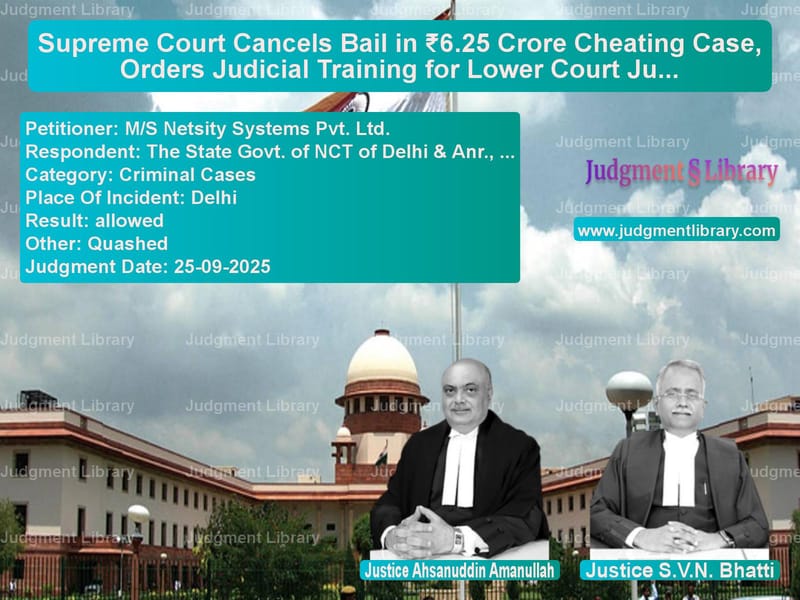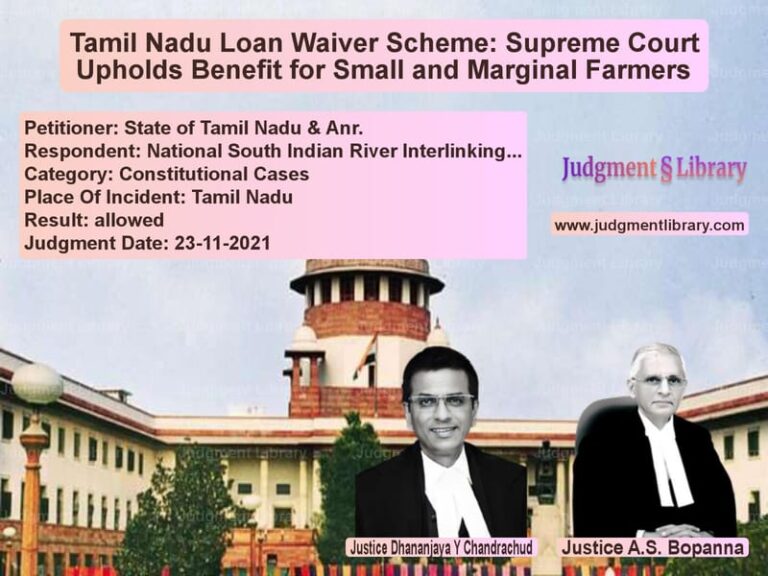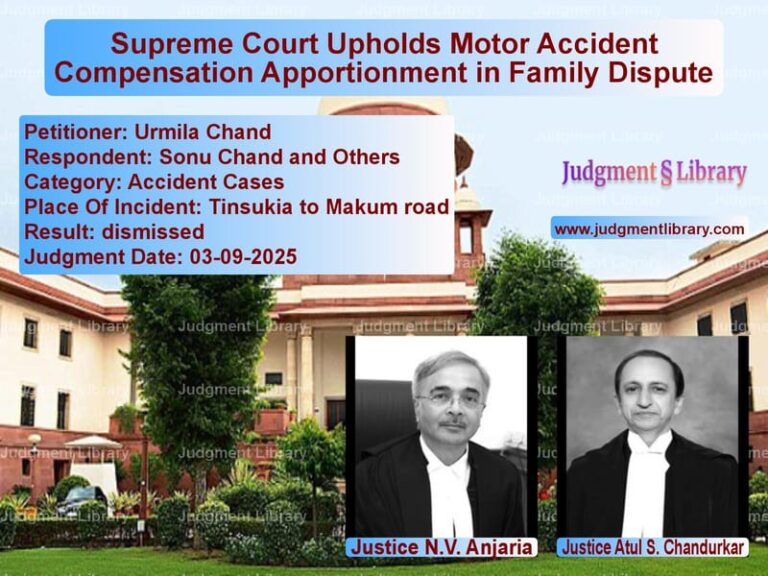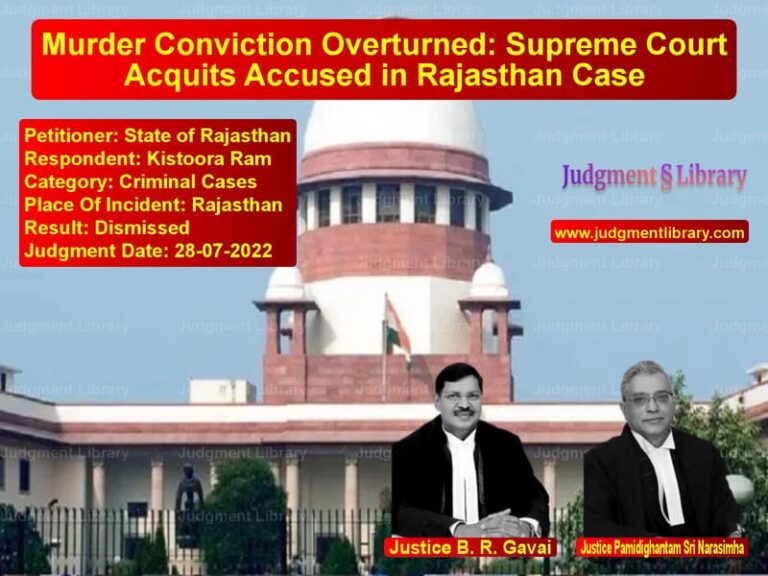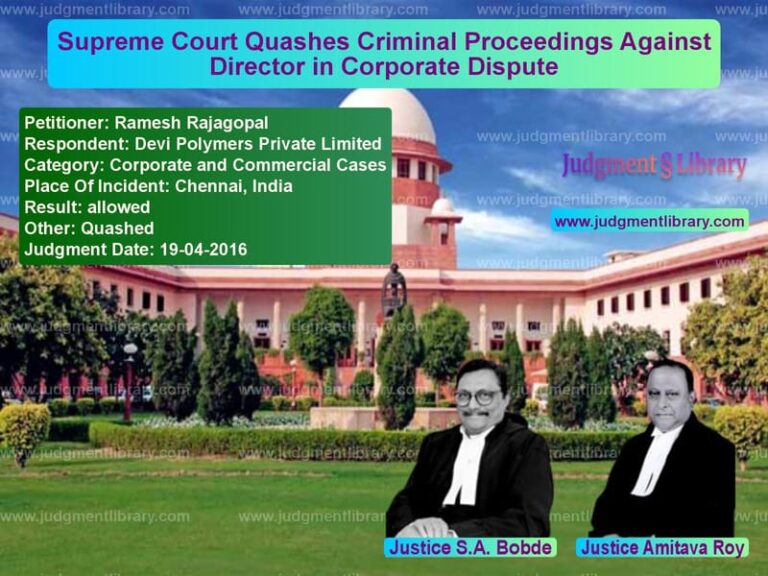Supreme Court Cancels Bail in ₹6.25 Crore Cheating Case, Orders Judicial Training for Lower Court Judges
In a significant ruling that underscores the importance of judicial accountability and proper application of bail principles, the Supreme Court of India recently delivered a hard-hitting judgment that cancelled the bail granted to a husband-wife duo accused in a ₹6.25 crore cheating case. The Court not only set aside the bail orders but also directed special judicial training for the lower court judges who had granted bail, while ordering an inquiry into the conduct of investigating officers in the case.
The case originated from Complaint Case No.4142/2017 filed by M/s Netsity Systems Pvt. Ltd. against Dharam Pal Singh Rathore and his wife Shiksha Rathore. The company alleged that the accused had taken ₹1.90 crore with the promise of transferring certain land, but it was later discovered that the land had been previously mortgaged and sold to a third party. When confronted, the accused refused to return the money with interest, which the complainant claimed amounted to ₹6.25 crore.
The legal journey of this case reveals a troubling pattern of the accused exploiting legal processes. Initially, both accused had filed pre-arrest bail applications before the Additional Sessions Judge in December 2018, which were dismissed. They then approached the Delhi High Court seeking anticipatory bail and obtained interim protection on December 21, 2018. This interim protection continued for almost four years while the matter was referred to mediation.
The High Court’s Strong Observations
When the High Court finally rejected the anticipatory bail applications on February 1, 2023, it made scathing observations about the conduct of the accused. The Court noted in Paragraph 11: “In case this plea is accepted, it will amount to giving liberty to an accused in economic offences to first appear before the Court, give an undertaking that he will make payment of the amount due before the court of law including this Court and obtain interim protection on that ground and thereafter, after years of enjoying the interim protection, a statement will be made that he will not make the payment being unable to do so and as a matter of right, will ask to be granted bail on the ground that now charge-sheet has been filed and his custody is not required. In this regard, this Court is of the opinion that it would rather amount to giving liberty to an accused to first mislead the Courts by giving an undertaking that payment will be made & thereafter, despite such undertaking for years, as in the present case for more than three years, accused(s), in the meanwhile will wait for the charge-sheet to be filed and enjoy the interim protection and after the charge-sheet is filed, will take a plea that now they are no more required to be sent to judicial custody. This situation will amount to travesty of justice, and taking the court and complainant for a ride.”
The High Court further observed in Paragraph 13: “Considering the same, especially the conduct of the petitioners before this Court, details of which have been mentioned above in the preceding paras, this Court is of the opinion that the courts have also been taken for a ride by giving false undertakings that the monies of the complainant will be returned, though knowing fully that they would not be in a position to make the payment, conveniently waiting for the charge-sheet to be filed.”
The Lower Courts’ Questionable Bail Grants
Despite these strong observations by the High Court, the Additional Chief Metropolitan Magistrate (ACMM) granted regular bail to the accused on November 10, 2023, primarily on the grounds that the chargesheet had been filed and the Investigating Officer had indicated that custodial interrogation was not required. The ACMM’s order noted: “The peculiarity in the facts of the present case is evident that the said anticipatory bail applications have been dismissed by the Hon’ble Delhi High Court after the filing of the present chargesheet and the accused persons have been chargesheeted for offences under Section 420/34 IPC without arrest.”
The complainant company challenged this bail order before the Sessions Judge, which rejected their plea on August 16, 2024. The Sessions Judge observed: “In the present case, there is nothing on record to suggest that accused persons are flight risks or that he may temper with the evidence or influence the witnesses. Further it has not been argued that the accused persons have violated any of the conditions of bail. It is settled law that bail cannot be withheld as punishment as the culpability of the accused is to be proved during trial.”
When the matter reached the Delhi High Court again, it dismissed the petitions challenging the bail grant through its Impugned Order dated November 18, 2024, leading to the present appeals before the Supreme Court.
Supreme Court’s Scathing Analysis
The Supreme Court bench comprising Justices Ahsanuddin Amanullah and S.V.N. Bhatti delivered a comprehensive judgment that left no aspect of the case unexamined. The Court expressed strong disapproval of the manner in which bail had been granted by the lower courts.
The Court noted: “We have deliberately adopted a mild mannerism in describing the ACMM’s Order dated 10.11.2023, even as the consideration adopted therein borders on the perversity. Bail matters are primarily to be adjudicated on the facts and circumstances, before applying any principle of law. In light of the glaring factual matrix, bail ought not to have been granted.”
The judgment extensively discussed the legal principles governing bail matters, referring to several recent precedents including Ashok Dhankad v State of NCT of Delhi (2025) and State of Karnataka v Sri Darshan (2025). The Court emphasized that “No precedent operates in a vacuum and must be co-related to the extant facts.”
Procedural Irregularities and Judicial Accountability
One of the most significant aspects of the Supreme Court’s judgment was its focus on the procedural irregularities in how bail was granted. The Court noted that the accused had technically surrendered before the ACMM on October 18, 2023, when their bail applications were taken up for hearing. However, they were allowed to leave the court without any formal order of release until the final bail order was passed on November 10, 2023.
The Court observed: “We are unable to comprehend how, having formally surrendered before the Court, the accused were permitted to leave the Court without any formal order of release. On perusal of Orders passed by the ACMM between 18.10.2023 to 10.11.2023, we do not see any order of release or of even a bond having been taken under Section 88 of the Code of Criminal Procedure, 1973.”
In a rare move that underscores the seriousness with which the Court viewed the lapses, it directed: “In the facts herein, we deem it appropriate that the Judicial Officers who passed the Orders dated 10.11.2023 and 16.08.2024 shall undergo special judicial training for a period of at least seven days. The learned Chief Justice, Delhi High Court, is requested to make appropriate arrangements for such training at the Delhi Judicial Academy, with particular focus on sensitizing the Judicial Officers on how to conduct judicial proceedings, particularly in matters where decisions of Superior Courts are involved and the level of weightage to be accorded thereto.”
Investigation Accountability
The Supreme Court also turned its attention to the role of the investigating officers, noting: “We would not shut our eyes to the role(s) played by the IOs either. The stand(s) taken by them before the Court(s) below speak volumes. Accordingly, the Commissioner of Police, Delhi, is directed to personally conduct an enquiry into the conduct of the IOs and take appropriate action, as deemed necessary. Needful be done on a priority basis.”
Final Ruling and Directions
After comprehensive analysis, the Supreme Court concluded: “Accordingly, in view of the discussions made hereinabove and on an overall conspectus, the ACMM’s Order dated 10.11.2023, the Sessions Judge’s Order dated 16.08.2024, as well as the Impugned Order dated 18.11.2024 passed by the High Court, are hereby quashed and set aside. We are not inclined to go down the route in Rahul Gupta (supra) and do not propose to remit the matters for being decided afresh. As such, the private respondents are directed to surrender before the ACMM within two weeks from today positively.”
The Court also directed the ACMM to conduct the trial expeditiously, bringing closure to a case that has been pending since 2017.
This judgment serves as a strong reminder that bail decisions must be made after proper application of mind to all relevant factors, including the conduct of the accused and observations made by higher courts. The Supreme Court’s directive for judicial training for the lower court judges involved highlights the importance of judicial accountability and proper understanding of legal principles, particularly in cases involving economic offences and habitual offenders.
Petitioner Name: M/S Netsity Systems Pvt. Ltd..Respondent Name: The State Govt. of NCT of Delhi & Anr., Dharam Pal Singh Rathore, Shiksha Rathore.Judgment By: Justice Ahsanuddin Amanullah, Justice S.V.N. Bhatti.Place Of Incident: Delhi.Judgment Date: 25-09-2025.Result: allowed.
Don’t miss out on the full details! Download the complete judgment in PDF format below and gain valuable insights instantly!
Download Judgment: ms-netsity-systems-vs-the-state-govt.-of-n-supreme-court-of-india-judgment-dated-25-09-2025.pdf
Directly Download Judgment: Directly download this Judgment
See all petitions in Bail and Anticipatory Bail
See all petitions in Fraud and Forgery
See all petitions in Criminal Defamation
See all petitions in Extortion and Blackmail
See all petitions in Cheque Dishonour Cases
See all petitions in Judgment by Ahsanuddin Amanullah
See all petitions in Judgment by S.V.N. Bhatti
See all petitions in allowed
See all petitions in Quashed
See all petitions in supreme court of India judgments September 2025
See all petitions in 2025 judgments
See all posts in Criminal Cases Category
See all allowed petitions in Criminal Cases Category
See all Dismissed petitions in Criminal Cases Category
See all partially allowed petitions in Criminal Cases Category

